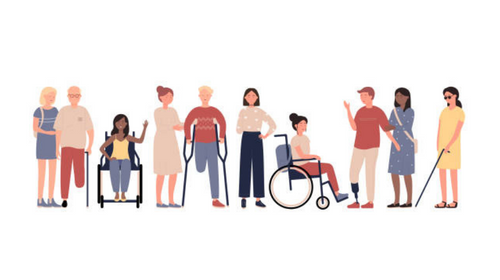
Experts have advocated that Persons With Disabilities should be given a chance at life, especially as it relates to employment, adding that they (PWDs) deserve it like every other person in society.
This was made known at a Special Needs Vocational Outreach conference organised virtually by the KTC-KYC Educational Consult & Academy on Saturday.
The conference with the theme, ‘Pathway to entrepreneurship in disability management: What can we do better?’, and moderated by the Director of KTC-KYC ECA, Ms. Damilola Oyalaja, had disability inclusion experts as panellists who spoke on different factors affecting the employability of the PWDs.
Speaking about limitations faced by the PWDs, an artist/disability advocate, Ms. Joy Odiete, J’odie for short, said the root of limitations to the PWDs was education.
J’odie said employability of the PWDs depended on how educated they were, asking, “If they’re not educated, how will they be employable?”
She lauded the organisers of the virtual conference, saying more of such were needed to bring experts and stakeholders together regularly to discuss issues affecting the PWDs. She said such conferences would provide the opportunity for “people in the circle of care for persons with disabilities” to deal with the foundation of their limitations, which, according to her, was education.
J’odie said many parents of the PWDs were overwhelmed by the condition of their special needs children rather than expose them to the right kind of education which would make them employable, adding that such a disposition would always result in having more adults living with disabilities who are unemployable.
She further added that it was important for experts and stakeholders to “find more artistic ways” to pass the message across to society in order to attract more people to get involved with the PWDs.
Another panellist, Ms. Susan Ihuoma, an educationist/disability inclusion advocate, said the major challenge being faced by the PWDs was the fact that issues of disability were charity-based.
Ihuoma said to help the PWDs have a chance at life, society must move away from seeing them as “objects of pity” but rather provide necessary information and opportunities for them to thrive.
She also identified structural barrier as a challenge to good life for the PWDs.
Ihuoma said many organisations where the PWDs would have been able to work and thrive did not have structures that provided accessibility for the PWDs in their establishments.
She added that employers did not accommodate the PWDs in their recruitment processes.
She said, “We are not saying (that they should) create a different space for persons living with disabilities… we are saying mainstream disability issue in existing structures. That has always been our entry point.”
The Executive Director of Theseabilities Foundation, Mr Adetoye Abioye, said the PWDs were considered as sub-human beings in the Nigerian society and this was what translated to how they were being treated in the workspace.
Abioye, while condemning how society viewed the PWDs, said everyone was “only one accident away from a disability,” adding that everyone was a candidate for becoming a person with disability.
“Given the fact that you wear glasses or use some aid, you are on your way to becoming a disabled person,” added Abioye.
He said how society treated the PWDs would be different if everyone viewed the issue of disability from that perspective.
Citing an instance of writing an examination relating to the PWDs at a university venue where they had to be aided by others to a higher floor than they could access, and with no ramp for easy access, Abioye said that would have been a good opportunity for the PWDs and their advocates to stand up for the needed change, adding that many people advocate inclusion but never walk the talk when confronted with real life situations.
Abioye said the situation in the institution changed within a week after one of the panellists at the SNVO conference took up the case with the authorities of the university, adding that, “society is not as wicked as we might think it is, it’s just very ignorant.”
He further stated that the electioneering season in Nigeria is an opportunity for the PWDs and their advocates to engage politicians on how to be included in their policies.
Abioye charged the PWDs to resort to self-help by standing up for themselves and becoming their own advocates demanding a better life from society, adding that “self-help is the best help.”
He added that people in society should be educated in easy life accessible to the PWDs and that as they do so, they should be informed that they are not doing the PWDs any favour as everyone is only an accident — or even an age — away from disability.





